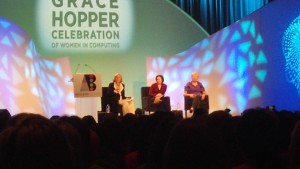I volunteered to blog this session because I am currently going through the Lean In lectures with a group of women at IBM. We meet monthly and do the following: recap the previous lecture, watch the next one, and discuss it. I was very interested to hear what Sheryl Sandberg had to say firsthand.
Yes, the pictures are from my cell phone; some are zoomed in; and all are held high in the air. My hope is that they give you the scope of the conference. There are over 4700 people here, mostly women, and I was sitting about 1/3 of the way back. Thankfully, the session was projected!
As the title promised, this session was a conversation. Even though the questions were prepared in advance, the session was mostly successful in fulfilling the tone of a conversation among women leaders.
There were many statistics given such as the following:
- Men run 95% of the big companies in the world.
- Men apply for new jobs when they meet 60% of the criteria, but women don’t apply until they meet 100%.
- Numbers of women in computing have plummeted to 13%.
- We need 1.4 million computer science majors by 2020 and we are currently only training 1/3 of them needed.
Other anecdotes were provided as examples:
- When men are perceived to have been successful, they say it was their own skill. When women are, they say it was due to hard work, help from others, and just being lucky.
- In fact, when Sheryl Sandberg was asked several years ago to speak at GHC, she turned it down thinking she wasn’t technical enough! Another executive at Google (where she worked at the time) spoke at the conference and she thought, “Why is he qualified and I’m not? He’s not even a WOMAN!”
- When little girls show leadership on the playground, they’re tagged as bossy. When they are older, they are viewed to be aggressive. When little boys show leadership, they’re just leaders. When you see someone telling a little girl not to be so bossy, you should say to them, “They aren’t being bossy. They’re just showing they have great executive leadership skills!”
- Sheryl was at a conference on a panel with a couple men. One of the men was asked about getting women in technology fields. He responded, “Not all women are like Sheryl. SHE’S COMPETENT!” When the other man was asked for his opinion, he said, “Well, my wife is here and she thinks that if I hire women, I might sleep with them. And, well, I might!”
- Gender has become an unsafe issue to discuss. It is not illegal to talk about it! It’s illegal to discriminate because of it.
- Concerning retention: A successful man is more well-liked. A successful woman is less liked. When a young girl was asked “What would you think if Daddy did well at work and was liked better, but Mommy did well at work and was liked less?” The girl’s response was, “Then I would do less well at work so more people would like me.”
One humorous example of how she met one of her colleagues was that about the first thing out of his mouth was “I haven’t read your book!” Now, in the interest of full disclosure, I haven’t read her book either, but it’s not because I think I’m going to disagree with it! It’s on my list. Really!
That example took me back about 20 years. You see, I was a first line manager at IBM early in my career. It was at a time in my life where I just thought that that’s what you were supposed to do! I had been with IBM about 5.5 years at the time and I think I had probably just turned 27. One of the first things one of my department members said to me was “I have a briefcase older than you!” I don’t recall having a good comeback for that one. I probably just stood there with my mouth open. It took me only about 18 months to realize I missed coding to much to stay in management.
Now, does that mean that IBM was a bad place for young, women managers? Absolutely not. In fact, I totally agreed with and appreciated the comments by Maria Klawe in this session when she said that she was privileged to work for IBM the first 8 years of her career and she greatly benefited from the diversity programs for women and minorities. She wished more companies did the same thing and it really furthered her career even though she went elsewhere.
There were quite a few quotable quotes and answer to questions in the session that truly resonated with me:
- Q: “Sheryl, why did you write Lean In?” A: “The world is still run by men and I’m not sure it’s going so well!”
- Q: “Sheryl, how does the book translate to other cultures?” A: Cultures are all so very different in their customs and traditions, but the stereotypes of men and women are universal.
- BOLD & CONFIDENT ^= BOSSY
- The fact that there are few women in computer science creates a deeply self-perpetuating stereotype. If more women see more women in computer science, it will feed on itself. Women are the best inspiration for other women and need to support each other. Mentoring is good, but we need more PEER interaction. Sheryl’s mentors actually DIScouraged her to take her last jobs whereas her peers ENcouraged her.
- You meed to ASK for what you want. Example: Telle Whitney retired with less stock than her male counterpart because she hadn’t ASKED for it.
- Q: “Sheryl, why did you start the Lean In foundation?” A: To encourage and empower women in three ways: 1) Build a community (obviously, leanin.org and/or facebook, 2) Offer expert lectures online (see leanin.org lectures), and 3) Start leanin circles.
There was a disappointing moment in the session that I think could have been used as an example of how we need to continuously strive to overcome our own obstacles. A fairly large part of this session was discussing Maria Klawe’s success at her college in getting women to major in computer science (48% of comp sci majors are female). When being congratulated on her success she said, “I didn’t really do anything.” Hmm…
There was a clear call-to-action in this session especially since they announced a partnership between the Anita Borg Institute and Lean In: Participate in lean in circles! Start one, join one, go to next year’s GHC. Lean In circles need to be started early — high school, college, and at every point after. More women in computer science will perpetuate more women in computer science!



Thanks for your detailed summary of this session, Karla! I wish I could have been there. I know what you mean about learning to take credit for our achievements. I still catch myself saying things like, “I didn’t really do anything.” Or “It was easy.”
Hi Karla,
I just have a question about your site – If you could please email me back when you get a chance I’d greatly appreciate it.
Kindly,
Jamie